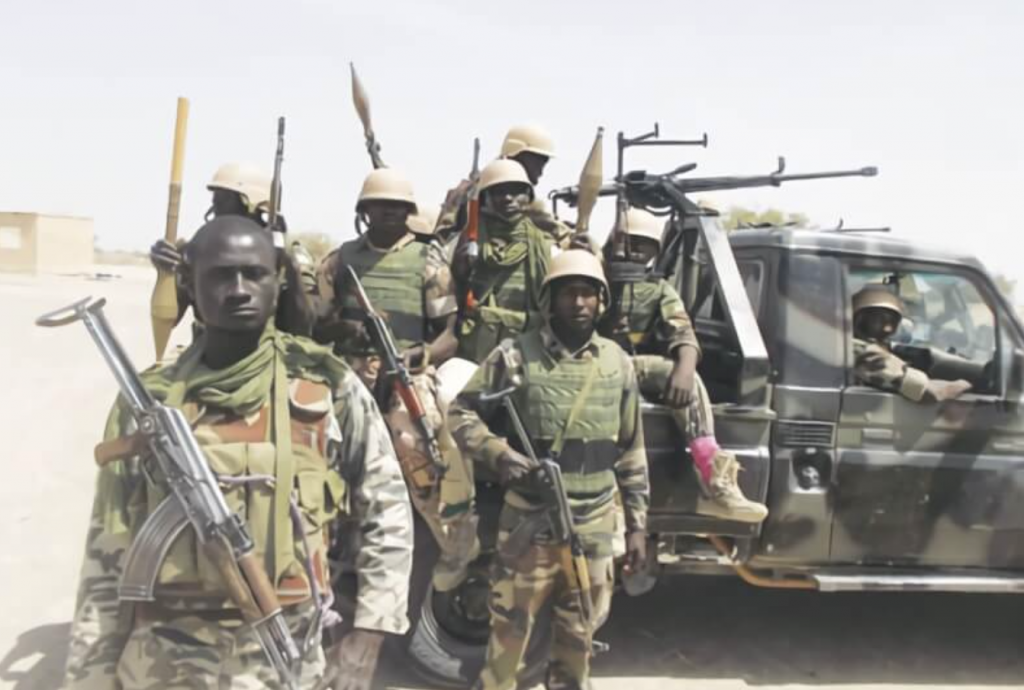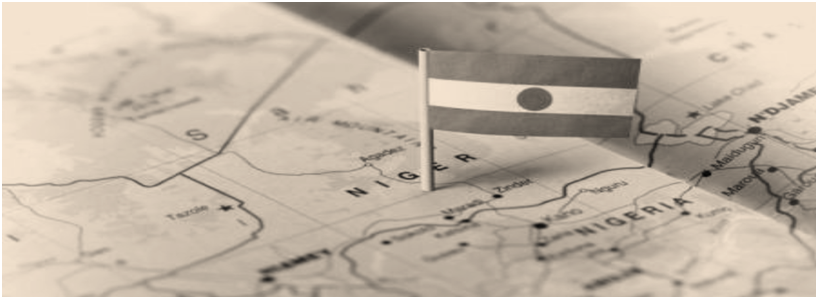
Weekly Highlights
- 4 soldiers and 63 jihadists killed in clash in Tillberi region bordering Mali
- 40 New cases of COVID-19 bringing total to 74 in Niger
- Niger’s Issoufou echoes warning that coronavirus could kill millions in Africa
- Over 250 rescued in Niger desert, put in quarantine
- Niger exchange rate – Exchange rates West African CFA franc – USD = 606.825 XOF XOF= 0.00164792 USD
EXECUTIVE SUMMARY
4 soldiers and 63 jihadists killed in clash in Tillberi region bordering Mali
Four soldiers and 63 jihadists have been killed in fighting between Niger’s army and heavily armed extremists in the nation’s west, the government said Friday. Extremists on motorcycles fought the army Thursday in the Tillaberi region near the border with Mali before being forced to flee, according to a defense ministry statement. The army was able to recover dozens of weapons and motorcycles, it said. Since December, at least 174 soldiers have been killed in Niger in several attacks. At least two were claimed by fighters linked to the Islamic State group.
40 New cases of COVID-19 bringing total to 74 in Niger
A statement from the Ministry of Public Health has just indicated 40 new cases of subjects carrying COVID-19 including 2 in the interior of the country, in Maradi in particular. The press release reports 2 deaths outside the care center. This brings the number of people carrying COVID-19 to 74 in Niger, including 5 deaths on April 1, 2020.
Niger’s Issoufou echoes warning that coronavirus could kill millions in Africa
In an exclusive interview with FRANCE 24, Niger’s President Mahamadou Issoufou discussed the Covid-19 pandemic that is spreading across the whole African continent. He called for a “Marshall Plan” from the international community to help African countries face the unprecedented health crisis. In an exclusive interview with FRANCE 24, Niger’s President Mahamadou Issoufou said that UN Secretary-General Antonio Guterres was right to warn that the coronavirus could kill millions of people in Africa. As a result, Niger’s leader is calling for a “Marshall Plan” from the international community to help African countries face this unprecedented health crisis.
Over 250 rescued in Niger desert, put in quarantine
More than 250 Europe-bound migrants were rescued in Niger’s arid north and placed in coronavirus quarantine after being abandoned by traffickers, the International Organisation for Migration said on Thursday. The IOM provided food and water to the group, including 104 Nigerians, 53 Ghanaians and 34 Burkinabes, who were rescued last week, the UN agency said on Facebook. They were transported from near the Libyan border to Agadez and housed in a football stadium for 14 days. IOM said large numbers of migrants were still coming to Niger, a key transit country for people hoping to make it to the West, despite Niamey closing its borders in the wake of the epidemic. A total of 764 migrants were quarantined at Assamaka, near the Algerian border, IOM said, including children and pregnant women.
AFRICOM, Air Force mismanaged $100 million drone base project in Niger, IG says
The U.S. military may have broken the law when it mismanaged funds and ineffectively planned the construction of a $100 million drone base in Niger, the Pentagon’s Inspector General said in a report issued Thursday. Now, the IG is calling upon the Pentagon and Air Force to launch a formal probe into how the project was handled and determine if laws and regulations were broken. Last year, U.S. Africa Command began operating out of Air Base 201 in Agadez after years of delays due to construction problems. The IG said the reason for the delays was that the military “did not effectively plan, design, and construct” the base and went outside the bounds of what Congress had approved for the site when it excluded runway shoulders in the project scope.
USEFUL INFORMATION
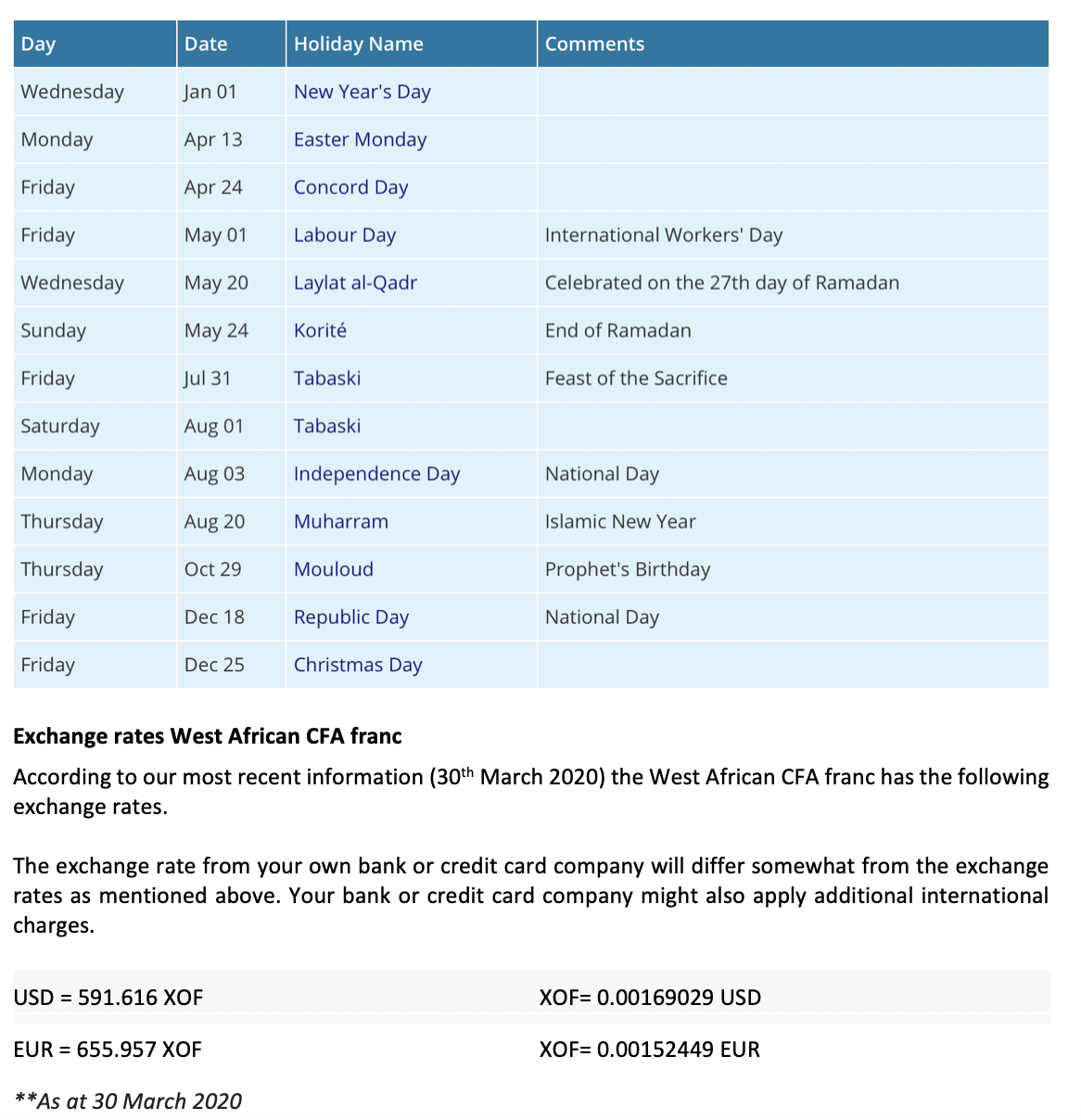
FREQUENTLY ASKED QUESTIONS ABOUT CORONA-VIRUS DISEASE (COVID-19)
COVID-19 Basics
Q: What is COVID-19?
A: COVID-19 is a virus strain, first identified in Wuhan, Hubei Province, China, that has only spread in people since December 2019.
Health experts are closely monitoring the situation because little is known about this new virus and it has the potential to cause severe illness and pneumonia in some people.
Q: How does COVID-19 spread and what are the symptoms?
A: COVID-19 is primarily spread through respiratory droplets. That means to become infected, you generally must be within six feet of someone who is contagious and come into contact with these droplets. It may be possible to get COVID-19 by touching a surface or object that has the virus on it and then touching your mouth, nose, or possibly their eyes, Symptoms of COVID-19 appear within two to 14 days after exposure and include fever, cough, diarrhea and shortness of breath.
Q: How long does it take for symptoms of the COVID-19 to appear?
A: The CDC believes that symptoms of COVID-19 may appear in as few as two days, or as long as 14 days after exposure.
Q: How is COVID-19 treated?
A: There is currently no FDA approved medication for COVID-19. People infected with the virus should receive supportive care such as rest, fluids and fever control, to help relieve symptoms. For severe cases, treatment should include care to support vital organ functions.
Prevention
Q: Is there a vaccine?
A: Currently, there is no vaccine available.
Q: How can I best protect myself?
A: Practice the following:
- Wash your hands with soap and water for at least 15-20 seconds. If soap and water are not available, use a hand sanitizer with at least 60% alcohol.
- Avoid touching your eyes, nose and mouth with unwashed hands.
- Avoid close contact (within 6 feet) with people who are sick.
- Stay home when you are sick.
- Cover your cough or sneeze with a tissue, then throw the tissue in the trash.
- Standard household cleansers and wipes are effective in cleaning and disinfecting frequently touched objects and surfaces.
- It’s currently flu and respiratory disease season and CDC recommends getting vaccinated, taking every preventive actions to stop the spread of germs, and taking flu antivirals if prescribed.
Q: Should I wear a face mask? Will that help protect me?
A: If you are sick: You should wear a facemask when you are around other people (like sharing a room or vehicle) and before you enter a building. If you are not able to wear a facemask (for example, because it causes trouble breathing), then you should do your best to cover your coughs and sneezes, and people who are caring for you should wear a facemask if they enter your room.
If you are not sick: You do not need to wear a facemask unless you are caring for someone who is sick (and they are not able to wear a facemask). Facemasks may be in short supply and they should be saved for caregivers.
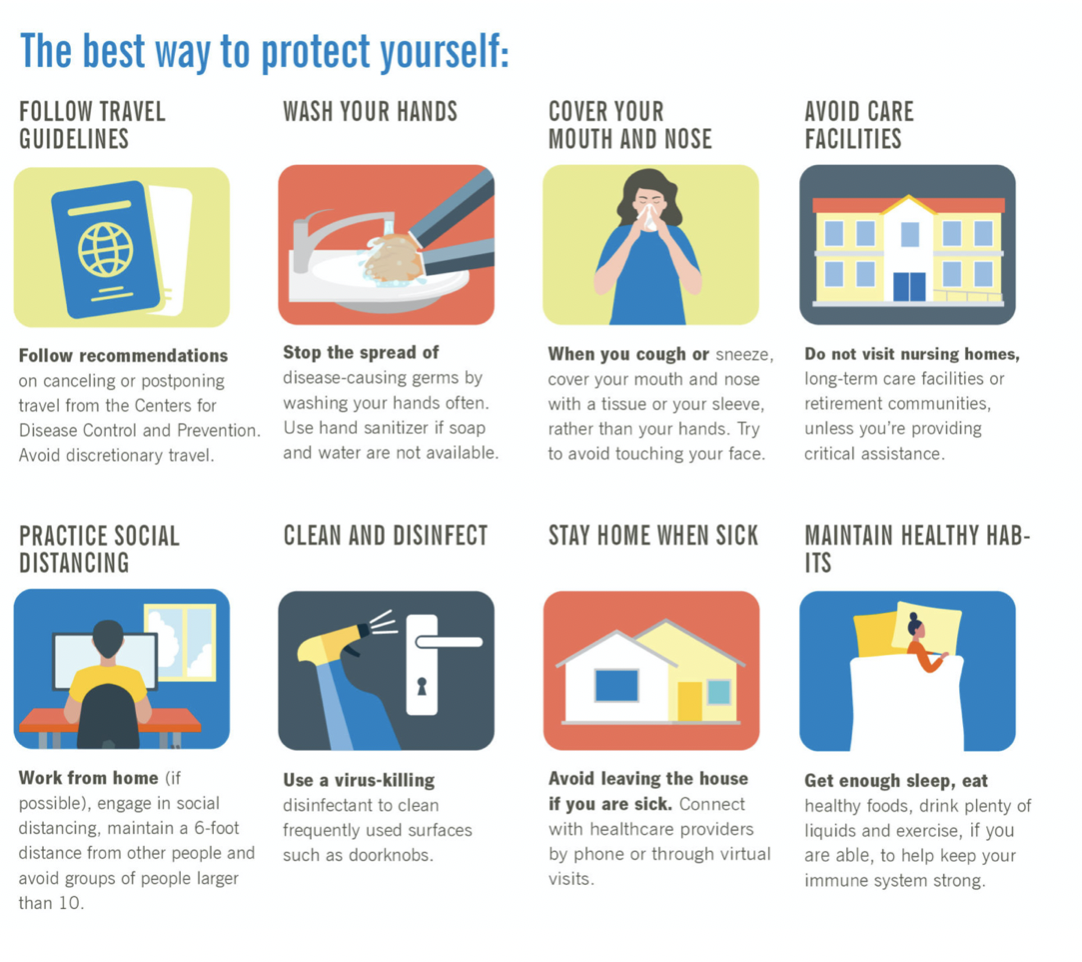
MEDICAL REQUIREMENTS AND INFORMATION
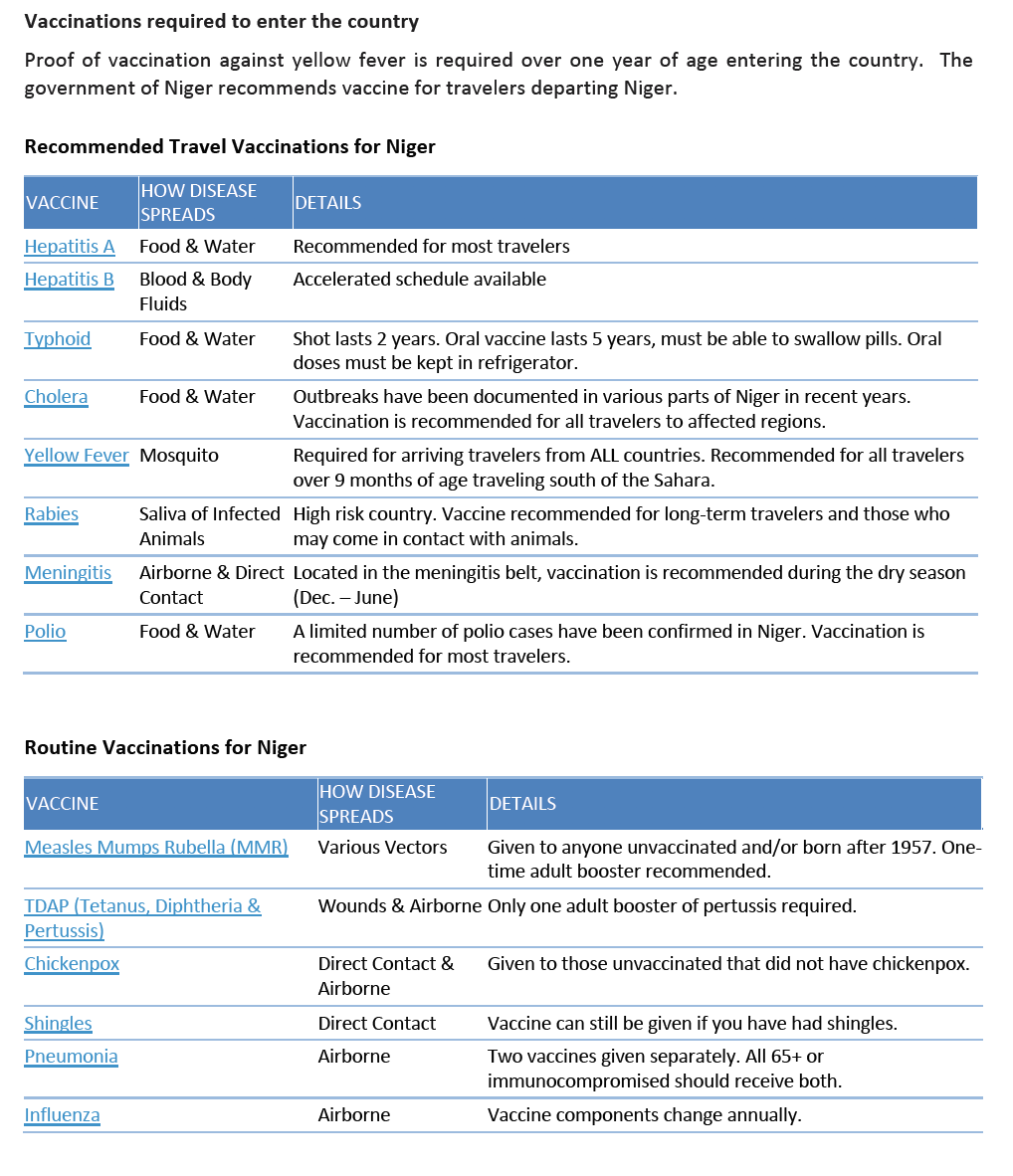
NIGER SECURITY & RISK LEVELS
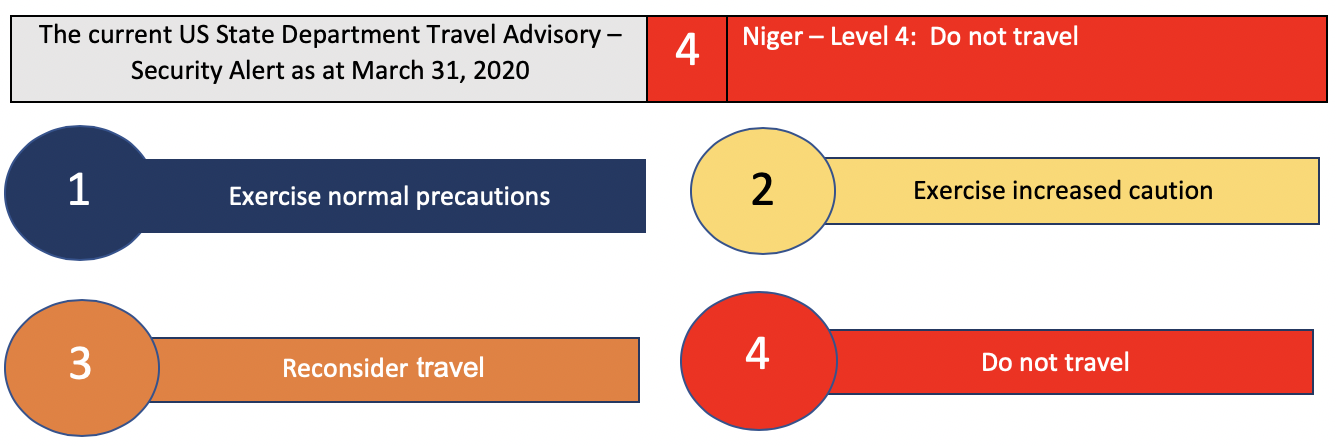
The Department of State advises U.S. citizens to avoid all international travel due to the global impact of COVID-19. In countries where commercial departure options remain available, U.S. citizens who live in the United States should arrange for immediate return to the United States, unless they are prepared to remain abroad for an indefinite period.
At present the Department of State is making every effort to assist U.S. citizens overseas who wish to return to the United States. As the Covid-19 situation develops, our ability to provide such assistance working with commercial airlines or arranging for evacuation flights may become more limited or even unavailable. In recent weeks, commercial airlines have significantly reduced flight schedules and countries have closed airports and borders with little advance notice. If you wish to return to the United States, you should make arrangements to do so now and contact the nearest U.S. Embassy or Consulate for assistance as needed. There is no guarantee that the Department of State will be able to continue to provide repatriation assistance and transportation options to the United States may be unavailable in the future. If you choose to remain overseas, you should be prepared to remain where you are for the foreseeable future.
U.S. citizens who live abroad should avoid all international travel. Many countries are experiencing COVID-19 outbreaks and implementing travel restrictions and mandatory quarantines, closing borders, and prohibiting non-citizens from entry with little advance notice. Airlines have cancelled many international flights and several cruise operators have suspended operations or cancelled trips. If you choose to travel internationally, your travel plans may be severely disrupted, and you may be forced to remain outside of the United States for an indefinite timeframe.
On March 14, the Department of State authorized the departure of U.S. personnel and family members from any diplomatic or consular post in the world who have determined they are at higher risk of a poor outcome if exposed to COVID-19 or who have requested departure based on a commensurate justification. These departures may limit the ability of U.S. Embassies and consulates to provide services to U.S. citizens.
If you decide to travel abroad or are already outside the United States:
- Consider returning to your country of residence immediately using whatever commercial means are available.
- Have a travel plan that does not rely on the U.S. Government for assistance.
- Review and follow theCDC’s guidelines for the prevention of coronavirus.
- Check with your airline, cruise lines, or travel operators regarding any updated information about your travel plans and/or restrictions.

NIGER INCIDENT MAPPING
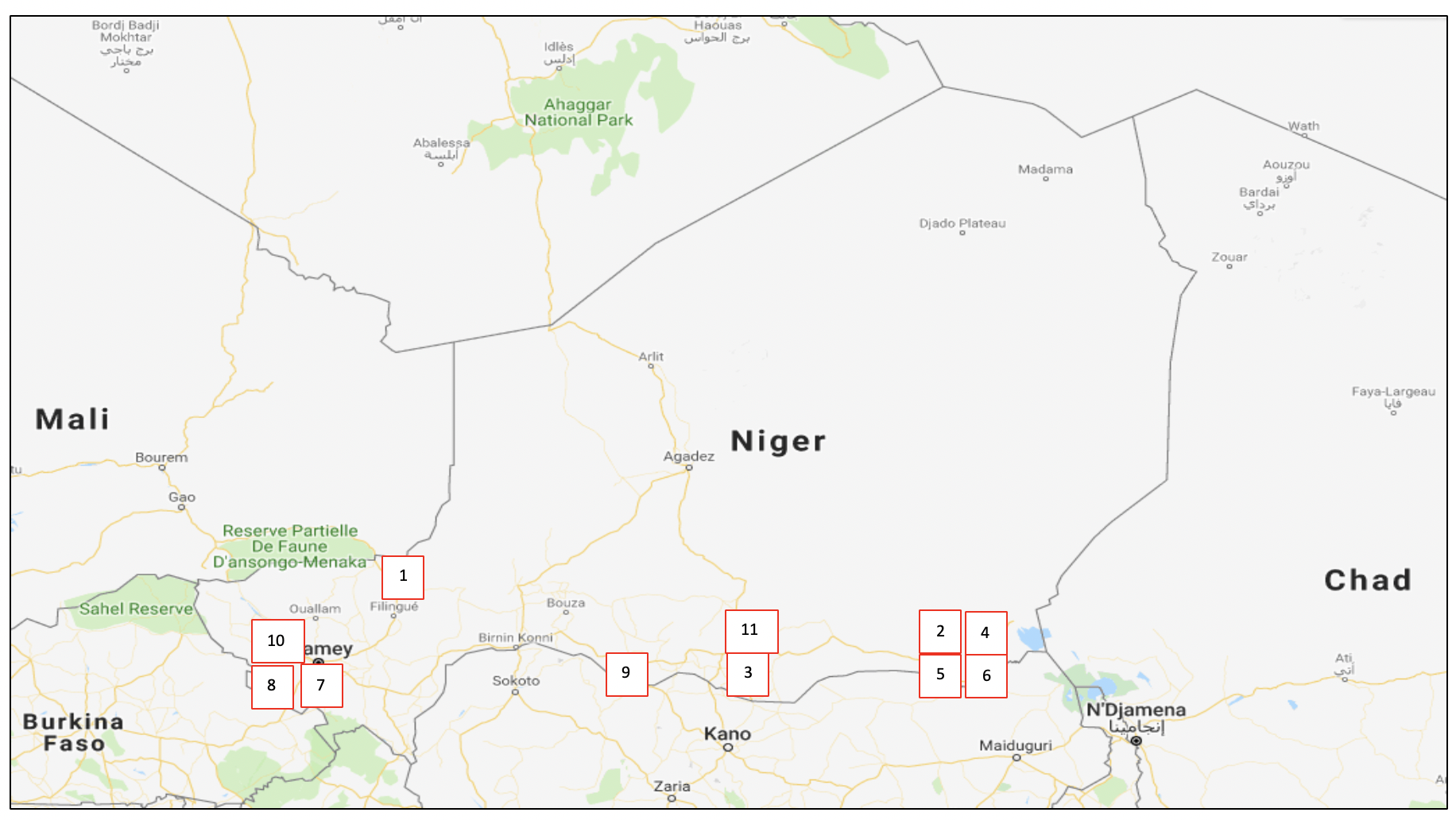
NIGER INCIDENTS IN DETAIL
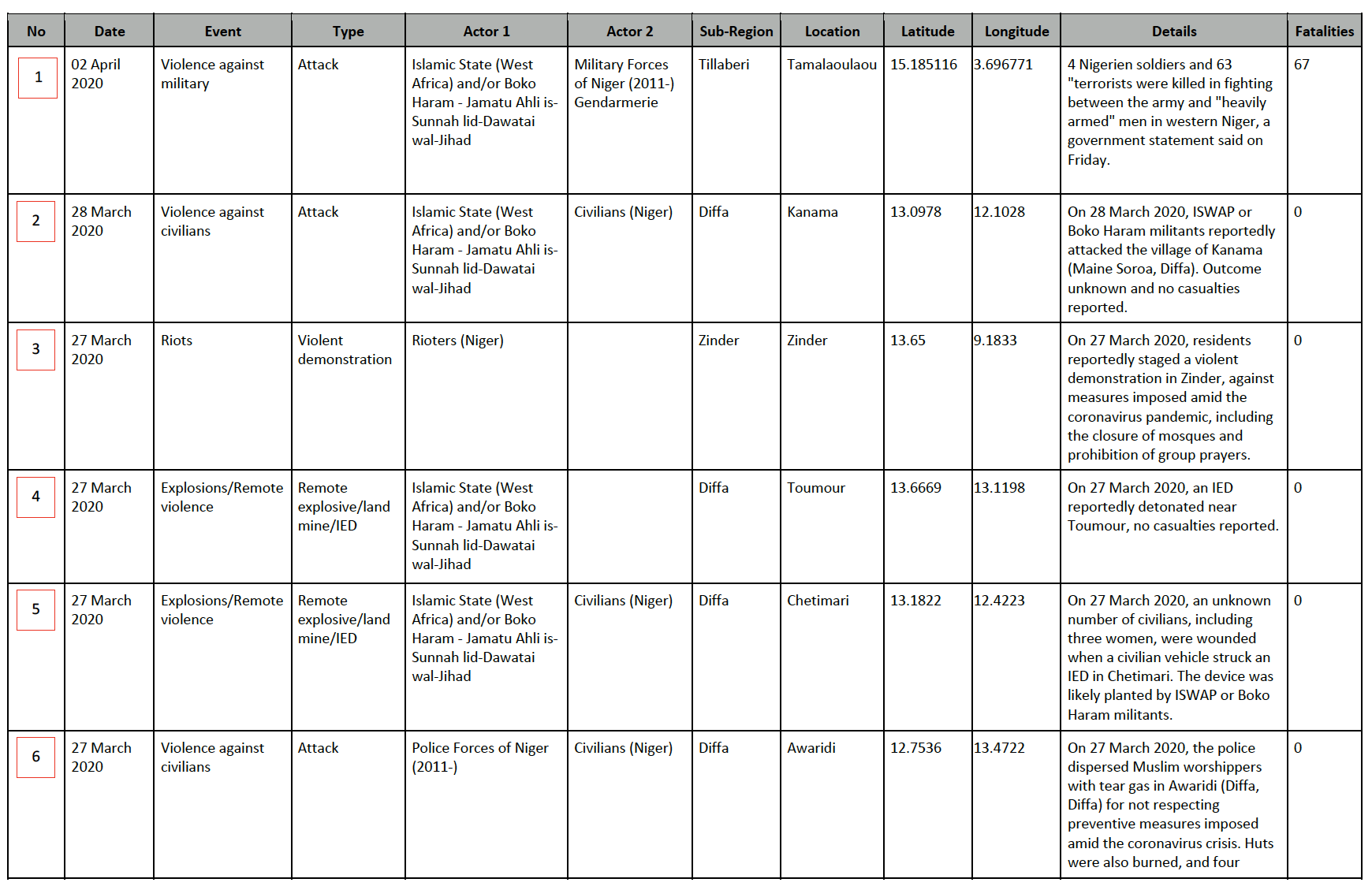
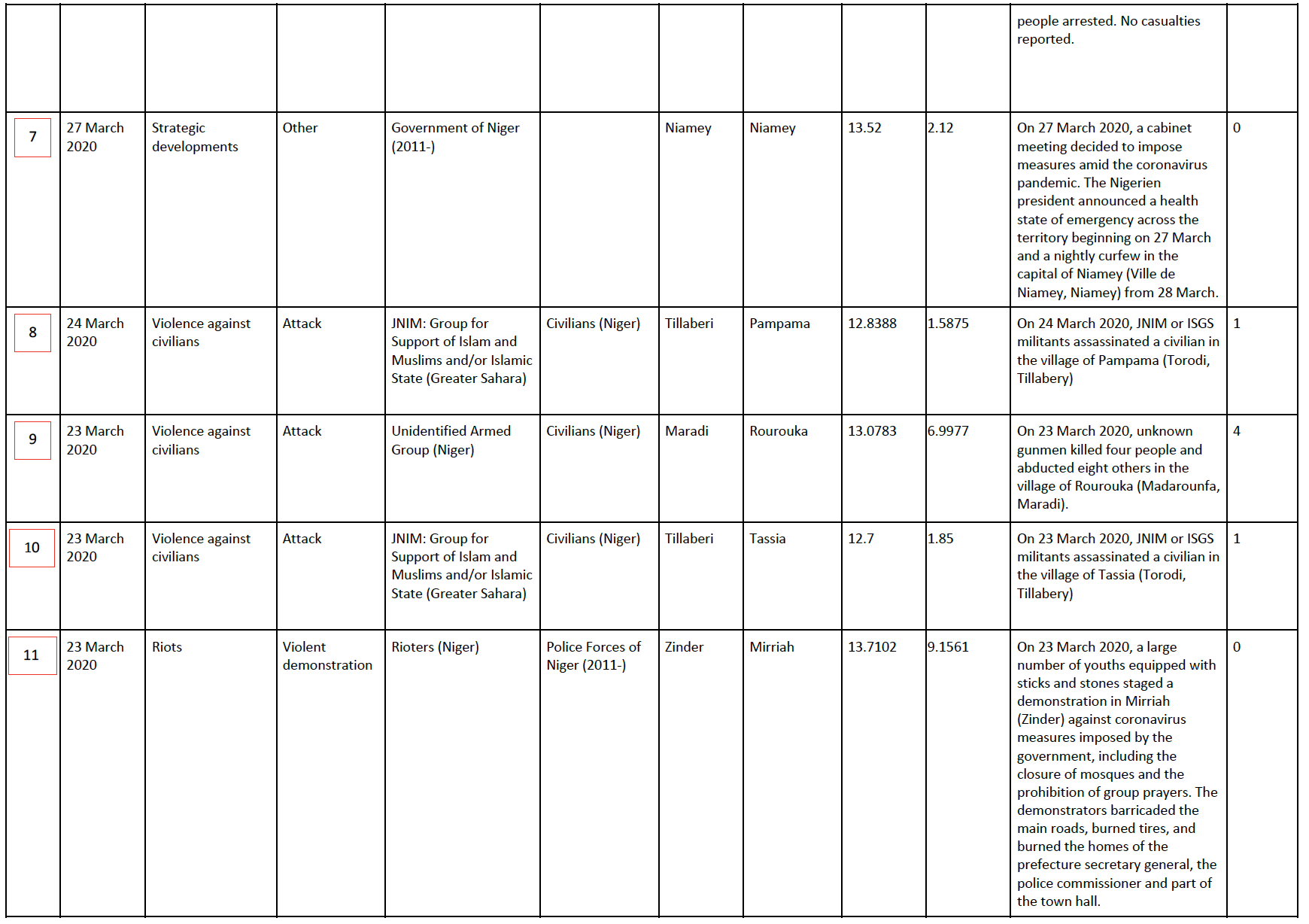
4 soldiers, 63 Jihadists killed in clash in Niger – 02 Apr 20
Four Nigerien soldiers and 63 “terrorists were killed in fighting between the army and “heavily armed” men in western Niger, a government statement said on Friday.
“After a fierce fight” on Thursday 02nd April, in the Tillaberi region near the border with Mali, the soldiers who had been on an anti-terrorist operation put the attackers “on the run” and recovered dozens of motorcycles and weapons, the Nigerien Defence Ministry said in a statement read on public television. The Tillaberi region is close to the borders of both Mali and Burkina Faso.
Use of motorcycles has been banned there since January in order to curb attacks by jihadists who are active there. According to an official report, 174 soldiers were killed in three attacks in the area in January and December. Two were claimed by Daesh.
The entire Sahel has become blighted by militant violence – often interspersed by conflicts between communities – which left 4,000 dead in Mali, Niger and Burkina Faso in 2019, according to the United Nations. Extremism has grown in West Africa’s Sahel region south of the Sahara Desert, with attacks increasing near the borders of Burkina Faso, Mali and Niger, where many jihadists linked to al-Qaida or IS operate.
POLITICAL OVERVIEW
According to Nigerian President Issoufou Mahamadou, millions of people could be killed in Africa because of the new coronavirus (Covid 19) which continues to claim many victims around the world, he said during an interview granted this April 3, 2020 to France 24. And to face this health crisis, the head of state proposes the establishment by the international community of a “Marshall plan”. This plan will allow him to help African countries rebuild after this crisis. The “Marshall Plan” is indeed a financial aid program drawn up in 1947 by George Marshall, the United States Secretary of State, with the aim of helping to rebuild Europe after the Second World War.
Opposition leader Hama Amadou regains freedom. He is one of a long list of 1,540 detainees released following a presidential decree to unclog jail houses as part of the fight against covid19. Former President of the National Assembly, he went to Filingué prison on November 18 to serve the remaining eight months of his one-year prison sentence for complicity in the presumption of children during a long trial qualified as political by its militants. He ended Thursday, November 14, three years of exile between France – where he fled in 2016 – and Benin. As soon as he arrived, he went to the cemetery to meditate on the grave of his mother, who died on October 24.
The members of the National Human Rights Commission (CNDH) and the heads of the General Directorate of the National Police (DGPN) had an exchange meeting on March 27. This meeting took place in the CNDH meeting room under the chairmanship of Professor Khalid Ikhiri, president of the National Commission for Human Rights (CNDH). The DGPN delegation was led by its Director General, Commissioner General Souley Boubacar. After discussions that lasted almost an hour, the two institutions, through their respective spokespersons, made a statement to the press, to explain the purpose of the meeting, which they appreciated the quality of the discussions that opened now the path to better collaboration. This meeting follows an incident that occurred on March 16, at the Judicial Police, where, on the instruction of the DGPN, a mission from the National Human Rights Commission was cut short.
By letter n ° 0012 / AN / SG dated March 25, 2020, the President of the National Assembly seized the Constitutional Court, to request an interpretative opinion of articles 91,93 and 94 of the said Constitution, this as a prelude to a re-entry parliamentary meeting which will take place in a particular health context which has justified solemn measures announced by the President of the Republic. In response to this letter the Constitutional Court issues the following opinion: “The National Assembly can take measures adapted to this new situation and in particular the limitation of the number of deputies in the hemicycle by resorting if necessary to a more flexible system of issuing proxies and rotation of the different deputies as well as the recourse to the in camera until the state of health emergency is lifted ”.
